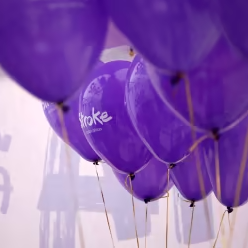Press release -
Stroke Recoveries and Services at Serious Risk in Northern Ireland says first report into the impacts of Covid-19 on stroke survivors
- 59% of stroke survivors in Northern Ireland said they have received less support from health and care services than usual, while half (50%) have had therapy sessions cancelled or postponed.
- 38% of stroke survivors told us they have had therapy (such as physiotherapy, occupational therapy and speech and language therapy) online or over the phone. This is higher than the UK average of 28%. However, it is still 13% less than the number of stroke survivors in Northern Ireland who had therapy cancelled or postponed during the pandemic. This suggests that some stroke survivors may have gone without the necessary rehabilitation and support to help their recovery.
- 64% said they were satisfied or very satisfied with virtual or phone appointments, showing the potential of virtual methods of healthcare to complement face-to-face approaches.
- 69% of stroke survivors report feeling more anxious or depressed during the pandemic, while 40% have felt abandoned. 62% have worried more about their health, while 65% have worried more about what the future holds.
- Before the pandemic, we already knew that 90% of stroke survivors in Northern Ireland felt that their emotional and cognitive needs were not being met. We know that psychology services are under pressure, now more than ever. But it’s clear that there must be increased investment in psychological and emotional support services for people affected by stroke to address these unmet needs.
- 1. Progress with the planned reform of stroke services to create a sustainable and high-quality service for everyone affected by stroke in Northern Ireland.
- 2. Roll-out a new, regional long-term support pathway, which is appropriately funded to meet the needs of people affected by stroke. In particular, the new pathway should address the following issues which have been exacerbated by the pandemic:
- The provision of the right rehabilitation support for people when and where they need it and for as long as they need it.
- Increased investment in psychological and emotional support services for people affected by stroke.
- Enhanced support for carers to take regular breaks and maintain their wellbeing, as well as a legal recognition of the vital role they play in our health and social care system.
With enough physio, speech and language therapy and mental health support, stroke survivors can recover, but only if governments and local health services act now, according to the first report into the effects of Covid-19 on stroke survivors by the charity.
Even before the pandemic, Stroke Association Research in Northern Ireland, (Struggling to Recover 2019) demonstrated that the level of long-term stroke care, rehabilitation and mental health support available was already letting down stroke survivors, and this has only been exacerbated by the Covid-19 crisis.
Key findings from the report:
93% of carers said they are providing more care and support during lockdown, far higher than the UK average of 77%. Those providing care during lockdown have told us they face additional pressures, with 61% of carers saying they feel overwhelmed and unable to cope. 94% of carers say they are finding it more difficult to carry out practical tasks, such as buying food or picking up prescriptions – this is again higher than the UK average of 80%. Despite this, only half (49%) of the carers who responded to our survey said that they had been given enough information, guidance and support during the pandemic.
There are 1.2 million stroke survivors living in the UK, that’s almost 39,000 people in Northern Ireland and over 100,000 strokes every year in the UK with 4,000 in NI, making stroke a leading cause of adult disability.
Barry Macaulay Director of Stroke Association in Northern Ireland, said: “The Report findings demonstrate the urgent need to reform stroke services in Northern Ireland, something which has been on the table since 2016. We were very encouraged that at the beginning of 2020, the Northern Ireland Executive made a commitment to reconfigure hospital provision for stroke and make improvements in stroke care by the end of the year. They emphasised that doing so would deliver better patient outcomes, more stable services and more sustainable staffing in stroke care in Northern Ireland. However, we were very disappointed that the ’Rebuilding Health and Social Care Services Strategic Framework for Northern Ireland’, published in June 2020, stated that it was ‘unlikely that stroke reforms will progress by end of 2020’.
While we appreciate the challenges posed by the pandemic for the health and social care sector, the Covid-19 crisis should be seen as an opportunity to reform our health system. Change is long overdue and we must do better to improve outcomes for stroke survivors and their families, both now and in the future. Staying as we are is not an option and a lack of progress puts lives and recoveries at risk”.
Covid 19 has also had a detrimental effect on the capacity of the charity sector to support stroke survivors, ironically at a time when demand is higher than ever.
Northern Ireland Chest Heart and Stroke work closely with the Stroke Association in delivering front line services to stroke survivors in Northern Ireland. Declan Cunnane, CEO of NI Chest Heart and Stroke, said: "Recovery from a stroke is tough, but with the right specialist support and plenty of courage and determination, the brain can adapt after stroke. The situation in managing stroke is now critical and that same courage and determination is needed now more than ever. Our two charities stand ready to support Health & Social Care. If we are to build our health service back better in a post COVID world, we need to start now with prioritising and funding vital stroke services in the community, otherwise a potential second wave of COVID-19 combined with winter pressures and rising waiting lists could create a tsunami of sickness”.
Recommendations for Northern Ireland:
In addition to the UK-wide recommendations detailed in the report, the Department of Health and Northern Ireland Executive should stand by commitments they made before the pandemic and urgently:
The Stroke Association are calling on governments across the UK and health and social care leaders, to implement the recommendations laid out in the new report to better support everyone affected by stroke. The charity is appealing to the stroke community in Northern Ireland and its allies, to take action and send a clear message today by signing an open letter to UK governments which you can find at www.stroke.org.uk/Covid-letter
The full ‘Stroke recoveries at risk’ report and executive summary can be found here: www.stroke.org.uk/covid-report
-ENDS
Topics
Categories
- Stroke strikes every five minutes in the UK and it changes lives in an instant.
- The Stroke Association is a charity working across the UK to support people to rebuild their lives after stroke. We believe that everyone deserves to live the best life they can after stroke. From local support services and groups, to online information and support, anyone affected by stroke can visit stroke.org.uk or call our dedicated Stroke Helpline on 0303 3033 100 to find out about support available locally.
- Our specialist support, research and campaigning are only possible with the courage and determination of the stroke community and the generosity of our supporters. With more donations and support, we can help rebuild even more lives.
- You can follow us on Twitter, Facebook and Instagram.











